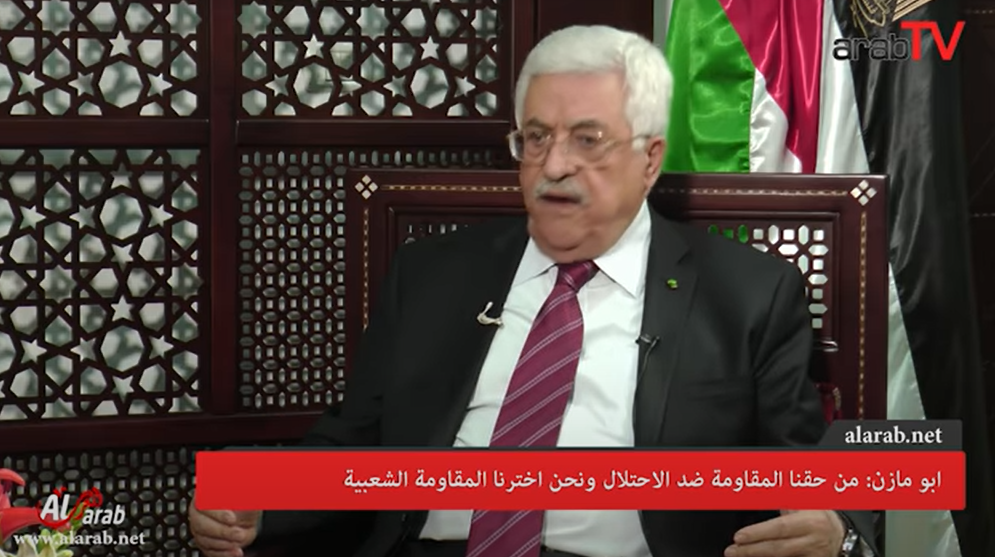The security weakening of the PA and the establishment of about 20 armed terrorist militias in various places in Judea and Samaria further endangers the rule of PA Chairman Mahmoud Abbas and the influence of the PA on the Palestinian street.
A senior official in the Fatah movement says that the PA is in a process similar to the process in which a patient is about to die and the best doctors who know that his end is near are making efforts to keep him alive in every possible way, including through artificial respiration.
Israel, the US, the European Union, Egypt, Jordan and the Gulf countries are not interested in the collapse of the PA, they understand that PA Chairman Mahmoud Abbas has lost security control over large parts of the West Bank and also his status on the Palestinian street while armed terrorist groups have taken over on the field and public opinion.
The political leaderships in the Fatah movement, which is the backbone of the PA, and the political leadership of Hamas are actually awaiting the departure of PA Chairman Mahmoud Abbas from the political arena, either naturally or through entering a state of medical impotence, in the meantime they are organizing for a general succession battle preparations for fighting in the field through armed militias established by senior Fatah officials, the new terrorist groups that arose in the West Bank after the “Guardian of the Walls” operation in May 2021 are also supposed to take part in the succession battle.
PA chairman Mahmoud Abbas insists on leaving the succession issue in ambiguity even though the expected succession battle after his departure from the political stage could lead to security chaos in the area and militia wars against each other.
Mahmoud Abbas has not created any agreed legal mechanism for an orderly transfer of power in the event that he enters a situation of impasse, he avoids holding presidential and parliamentary elections for fear that he will lose the presidential elections and that the Fatah movement will lose the parliamentary elections to the Hamas movement as it happened in the parliamentary elections in 2006.
The Palestinian candidate for the position of president who is very popular on the street and who can defeat Mahmoud Abbas in the general elections, according to Palestinian public opinion polls, is Marwan Al-Barghouti, the terrorist architect of the second intifada who is serving a sentence of 5 life sentences in an Israeli prison.
Mahmoud Abbas weakened the institutions of the PLO since he was elected to his position in 2005 in order to strengthen his rule, he did lose control of the Gaza Strip to the Hamas movement in 2007 but since then he has strengthened his position in the PA and the leadership of Fatah, dissolved the parliament and became a dictator who decides in anything.
Despite his extreme age (88) he is not ready to hear about the possibility of retiring from his position and he intends to remain in his position until the last moment, a senior member of the Fatah movement says that he will leave the Muqatea in Ramallah “only on a stretcher”.
Senior Fatah officials tend to agree on the establishment of a temporary leadership that will manage the affairs of the PA after the departure of Mahmoud Abbas from the political stage until the holding of general elections for the presidency and the parliament. This is to prevent bloodshed between the various militias and not to be dragged into a civil war. PA Chairman Mahmoud Abbas refuses to designate a successor from the top of Fatah or appoint a deputy to whom he can gradually transfer governmental powers.
According to the latest public opinion survey by the Institute for Political Studies in Ramallah, 63 percent of the Palestinian public believes that the PA has become a burden on the shoulders of the Palestinians and 57 percent claim that the PA remains in Israel’s best interest.
52 percent believe that the Palestinian interest is to dissolve the PA or allow its collapse.
A senior Israeli political official says that the current Israeli government has no intention at the moment of annexing Judea and Samaria or managing the day-to-day lives of more than two million Palestinians in these territories, this is the PA’s mission.
However, following the election results and the rise of the right-wing government in Israel, discussions have recently begun in the Palestinian political arena about the fate of the PA and its future in light of the failure of the PA’s political agenda and its negotiation strategy with Israel.
PA senior officials are following with concern the statements of several ministers in the Israeli government regarding the need to dissolve the PA and turn it into an administrative government divided into several regions in the West Bank.
The PA was established in accordance with the Oslo Accords, but due to the failure of the agreements and the lack of an election process, it has lost the legitimacy on the Palestinian street to represent the Palestinians.
The PA claims that Israel greatly weakens it by the fact that the IDF enters Area A every day and makes arrests, on the other hand, Mahmoud Abbas head of the PA is not ready to confront the armed terrorist groups and dismantle them.
While the Palestinian political system is debating on the future of the PA, it seems that Israel prefers that the PA continue to manage the daily lives of the Palestinians in Judea and Samaria instead of a situation of security chaos, it wants an address with which it can coordinate security issues, the current Israeli government wants the PA to remain in power on the condition that it will resolutely fight terrorism, It wants its government to be politically weakened and dependent on the State of Israel.




